Majority In Iran’s Sistan Province In Dire Poverty, Lawmaker Says
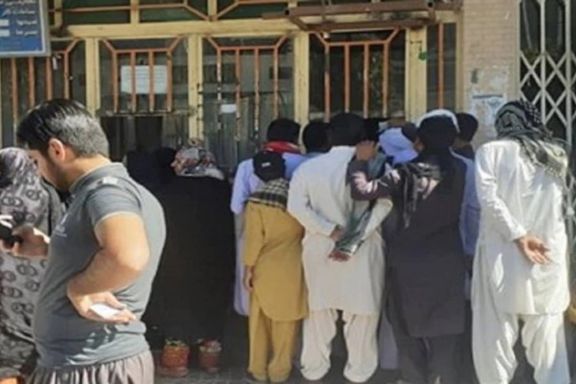
An Iranian lawmaker representing the mainly Sunni Muslim southeastern Sistan-Baluchestan Province says the poverty in the region has reached extreme levels.

An Iranian lawmaker representing the mainly Sunni Muslim southeastern Sistan-Baluchestan Province says the poverty in the region has reached extreme levels.
Member of Parliament, Mohammad Sargazi, said most citizens consume water, tomato paste and bread as their main meal.
Sistan and Baluchestan is the poorest province of Iran with a population of around 4 million, including 700,000 Afghan nationals.
During the past years, this region has experienced many crises, including shortage of fuel, bread, and drinking water, as well as drought, widespread unemployment and increasing poverty.
Despite frequent promises to improve the situation, successive administrations have done little to invest in the region, create jobs, build housing or even decent schools. Some children study outdoors, while teenagers smuggle small quantities of fuel to neighboring Pakistan to make some money.
Narcotics smuggling from Afghanistan is also a serious problem in the region, with hundreds of small-time traffickers executed each year according to Iran's tough criminal laws.
In the recent popular protests following the death in custody of Mahsa Amini, Sistan-Baluchestan has had the highest number of victims among 31 provinces.
The Islamic Republic has been struggling with high inflation since 2019, but the raging inflation in the past Iranian year which ends on March 20, was seriously different from previous years.
Food prices continue to climb as the national currency declined by 50 percent in the past six months. According to the report of the Statistical Center of Iran (SCI), in some months, the food and beverages inflation hit 87%.
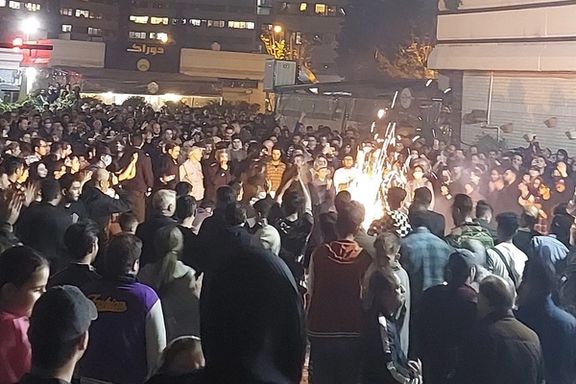
As Iran’s financial crisis continues, former President Hassan Rouhani has claimed that his pragmatic government would have handled the situation more efficiently.
Rouhani alluded to a temporary rise in the value of Iran’s rial in late March when news emerged that his former nuclear negotiator and deputy foreign minister Abbas Araqchi (Araghchi) had gone to a diplomatic tour of Syria and Lebanon.
"If former Foreign Minister Zarif went for that mission rather than his deputy, the rate of exchange would have possibly dropped [more] by 50,000 rials," he told former aides in a Nowruz gathering this week.
Rouhani and Iran’s reformists have been blaming conservatives and hardliners who control both the presidency and the parliament of squandering the chance to reach an agreement with the West over Iran’s nuclear program, or the inability to manage the economy amid US sanctions.
Hardliners offer contradictory responses. They blame the sanctions when pressed to explain their economic failures, but also claim economic progress is not dependent on sanctions when they want to justify their anti-West ideology or defend their pro-China and pro-Russia policies.
Rouhani dismissed his successor's claim about lack of any connection between foreign policy and economy as "baseless." He said, "at least twice Iranian governments managed to reduce the inflation rate; once between 2003 and 2005 under [moderate] President Mohammad Khatami, and again in the years 2016 to 2018 in my own government."
He reminded that following the 2015 nuclear deal with the West, Iran's economic growth was strong.

Meanwhile, he once again called for a referendum in Iran to determine foreign and domestic policies.
In a related development, conservative pundit Mohammad Mohajeri wrote in a commentary in Etemad newspaper that Iranians will no longer take part in elections just out of a sense of religious or national responsibility.
He added that the undecided [grey] part of the Iranian population now calculates whether to take part in the elections based on how it might affect its livelihood.
However, the emergence of political alliances in the conservative camp and the discussions about impeaching some of the cabinet ministers show that the issue of elections is not totally out of the people's agenda. By discussing impeachments, the government's political rivals signal their presence.
He recalled that the previous parliamentary election was affected by Trump's withdrawal from the nuclear deal with Iran, the Covid pandemic and the people's disillusionment about the possibility of any change in the structure of the government. The result, he said, was unprecedented low turnout which was lower than 20 percent in some of Iran's big cities.
"Now the people are waiting for a move [in the top layer of the political structure] that would indicate there is a will for change," Mohajeri said, reminding that the weakness of the current parliament, possibly the weakest one in the history of Iranian parliaments, leaves no hope in the legislative body. Meanwhile, the regime’s increasing willingness to bar the candidacy of even loyal politicians leaves very little hope for participation in the elections.
Mohajeri expressed regret that although following the shock of the 2022 protests disconcerted officials talked about reforms, but a few weeks after relative calm, they seem to have forgotten their promises. Politicians and regime insiders might be happy even with small changes, but those who took to the streets for over five months and the women who are staging a spectacular show of civil disobedience by rejecting compulsory hijab may have big ideas in mind.
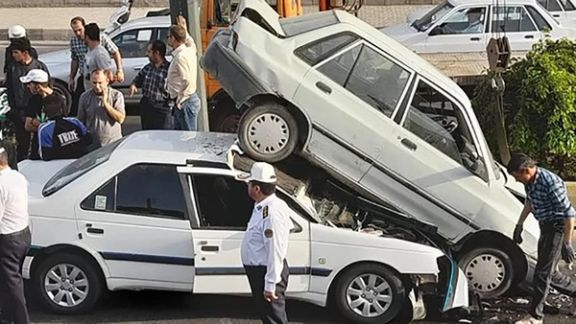
Iranian Traffic Police say more than 85 thousand car accidents occurred during the Nowruz holidays, with 871 people killed, one third of those, children.
The statistics, which cover the period since from March 20 to April 2, are dominated by two Iranian made cars, notorious for their poor quality, in addition to the poor infrastructure of Iran’s roads.
Deputy Commander of the traffic police, Teimour Hosseini said the two Iranian car manufacturers’ vehicles, made by Iran Khodro and Saipa, constituted half of the deaths.
While families drive long distances across the country to visit family and take vacations, Hosseini said other factors were also at play, attributing to the high death rate, typical of the holiday season.
He said “over speeding, not paying attention, tiredness and sleepiness" were the main reasons for accidents, but he ignored the issue of non-standard roads and unsafe cars made in Iran.
The regime in Iran tries to convince citizens that the “human factor,” or the drivers, is the main reason for this massive amount of fatalities on the country’s roads.
Iran has one of the worst world’s statistics in terms of road accidents -- at its worst during Nowruz.
Between March 2021 and March 2022, Traffic-related accidents claimed the lives of nearly 17,000 Iranians. Local media says One person dies in a road accident every half hour in Iran.
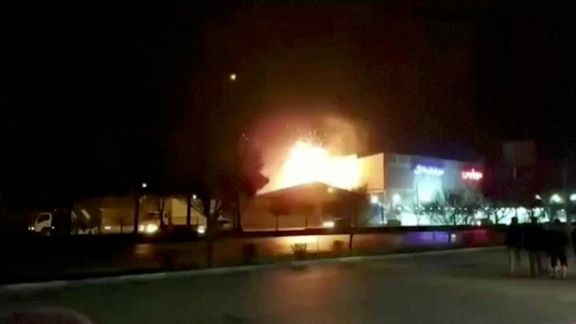
Amid mounting tensions between the Islamic Republic and Israel, there are contradictory reports about the downing of a drone approaching a military site in Esfahan.
Iran's semi-official Tasnim news agency reported Wednesday that the Amir al-Momenin complex was “the target of a failed attack” by a small drone.
The IRGC-affiliated website confirmed the incident and claimed it did not cause any damage. However, there have been no eyewitness accounts or reports among local citizens corroborating the news.
Countering the IRGC, the security deputy of Esfahan governorate, Mohammad-Reza Jan-Nesari, denied any attack on the complex in the area subject of a series of explosions at an Iranian government weapons factory in January. At the time, Iran claimed the explosions were unsuccessful and perpetrated by "mercenaries of the Zionist regime”.
It is also believed that Israel recently carried out the drone attack on the Iranian military center for research and development.
Tehran has repeatedly blamed its arch-foe Israel for such attacks though Israel has neither confirmed nor denied responsibility.
The incident comes days after Israeli air strikes in Syria hit Iran-linked targets that killed at least two Iranian Revolutionary Guards Corps (IRGC) members that served as military advisers in Syria.
This week, Israeli Prime Minister Benjamin Netanyahu told a meeting of intelligence officials that Iran remained the nation’s “supreme mission”.
”In every generation there are those who rise up to destroy us and in this generation Iran has risen up to destroy us,” he said.
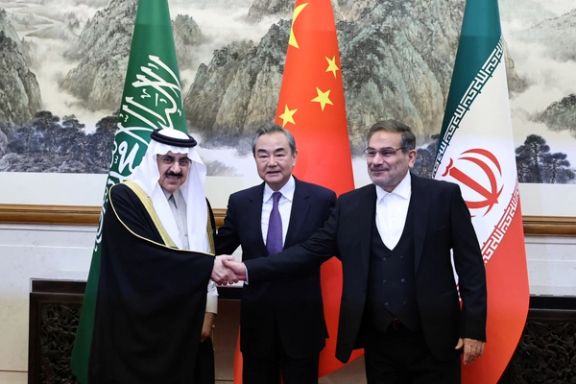
Saudi and Iranian foreign ministers will meet in Beijing Thursday, sources in both countries said, as the two continue rapprochement amid a China-brokered deal.
The meeting between Prince Faisal bin Farhan Al Saud and his Iranian counterpart, Hossein Amir-Abdollahian, will be the first formal meeting between Saudi Arabia and Iran's most senior diplomats in more than seven years.
After years of hostility that had fueled conflicts across the Middle East, Tehran and Riyadh agreed to end their diplomatic rift and re-open embassies in a major deal facilitated by China last month.
"The top envoys agreed to meet on April 6 in Beijing as the deal was facilitated by China," a senior Iranian official told Reuters.
Choosing China "came as an extension of Beijing's positive role in reaching the agreement and facilitating communication between the two countries," Saudi-owned Asharq al-Awsat newspaper cited an unidentified source in Riyadh as saying.
The resumption of relations and arrangements for the exchange of ambassadors will be discussed in the meeting, it added.
Saudi Arabia cut ties with Iran in 2016 after its embassy in Tehran was stormed during a dispute between the two countries over Riyadh's execution of a Shi'ite Muslim cleric.
The relationship had worsened since 2015, after Saudi Arabia and the United Arab Emirates intervened in the Yemen war, where the Iran-aligned Houthi movement ousted a Saudi-backed government and took over the capital Sanaa.
The kingdom has blamed Iran for arming the Houthis who carried out missile and drone attacks on its cities and oil facilities. Iran has denied the charge, although there is plenty of material evidence of Iranian weapons being used by Houthis.
With reporting by Reuters
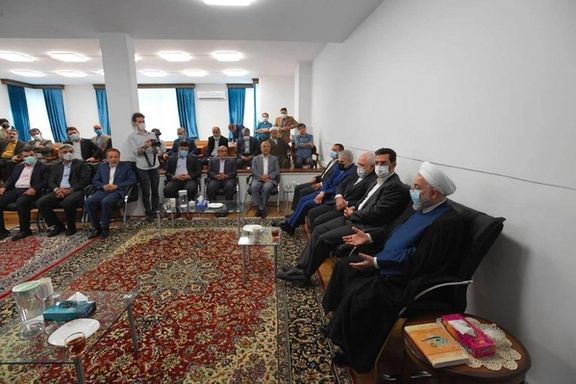
Former Iranian President Hassan Rouhani says the Islamic Republic faces a test in the 2024 parliamentary elections if they are not fair and free.
“The eyes of the world are on the elections so that they see, and we see, whether the elections are held in a healthy, competitive and free manner or not,” the former president said at a meeting with the senior officials of his government, former lawmakers, journalists and politicians on the occasion of the New Year.
While describing the events of the past few months as sad, he reiterated that the answer to people’s demands in the areas of foreign and domestic policies and economy could be found by holding referendums as envisaged by the Constitution of the Islamic Republic.
This was the second time since the beginning of nationwide protests in mid-September that Rouhani suggested fair and free elections and holding referendums as the only way the regime could overcome huge popular discontent within the existing political structure.
Domestic solidarity and the ability to solve problems cannot be attained with “minority government and parliament,” Rouhani said at a meeting with journalists in February referring to widespread protests since mid-September. “The key to solving today’s problems is returning to competitive elections and people’s extensive presence on the scene.”
He also said elections of the first parliament after the Islamic revolution in 1980 could be taken as a model for free elections “to help the country navigate through these difficult circumstances by relying on people’s power.”

The government has set March 1, 2024, as the election date. The regime is likely to have a very difficult time raising any interest in the elections among the hugely disillusioned citizens many among whom said during the recent anti-government protests they wanted not reforms but the end of the Islamic Republic because of its failure to improve the economy, its restriction of social freedoms and its corruption.
After the very lackluster parliamentary elections of 2020 and presidential elections of 2021, in which turnout dropped to unprecedented levels in the history of the Islamic Republic, many said they would never vote again.
The Khamenei-appointed Guardian Council barred even the least controversial reformists and many moderates as well as nearly one-third of the sitting lawmakers from running in February 2020 in the elections of the 11th parliament. Consequently, hardliners won a decisive majority.
The elections were held within a few months from the nationwide anti-government protests of November 2021 during which hundreds were killed by security force.
Not only the opposition, but also most reformist parties and groups boycotted the elections in which only 42.5 percent of the electorate voted. According to rather dubious official data, the minimum turnout for the previous elections was 50.8 percent in 1996 with the highest turnout, 67 percent, in the elections of 2002 in which reformists gained an overwhelming majority in the parliament.
In the presidential elections of 2021, the Guardian Council barred nearly anyone that it considered as challenging to hardliner Ebrahim Raisi including the moderate conservative former Parliament Speaker Ali Larijani.
The government said 48 percent had voted in the 2021 elections but 13 percent of the votes, apparently cast by those who thought not voting could get them into trouble with the authorities, were blank or otherwise not valid.
These elections also followed widespread anti-government protests in July of the same year. At the time, Rouhani said at a cabinet meeting that he had written a letter to Supreme Leader Ali Khamenei to protest the Guardian Council’s extensive disqualification of candidates in the presidential race. “We cannot forsake [the role of] ballot boxes. What are you going to substitute for ballot boxes if you forsake them?”